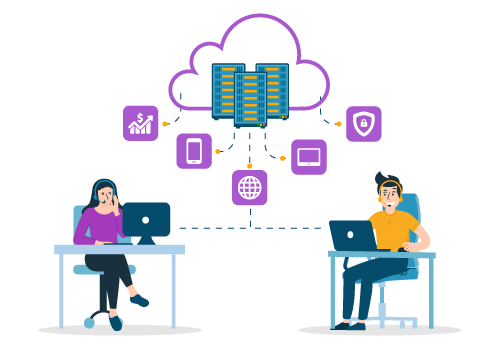Senior Writer: Paras Kela
Just as your company requires a client communication system to establish an efficient communication channel with its customers, it also requires an internal communication solution that allows intercommunication between internal telephones within the institution without external lines.
One such well-known and widely used telephone exchange solution is the Private Branch Exchange (PBX). In today’s blog, we will look at the PBX definition, types of PBX, PBX benefits, the difference between PBX and VoIP, and more.
Let’s begin with a definition– what is a PBX phone system?
What is PBX?
A PBX, or Private Branch Exchange, is a business telephone system used for internal communication within an organization. It enables the sharing of central office trunks between internally installed telephones and provides intercommunication between those internal telephones within the organization without using external lines.
The central office telephone lines are linked to the PSTN (Public Switched Telephone Network). Also, the PBX phone system allows you to connect two or more extensions without using the PSTN. Eventually, this technique will reduce the number of lines required to connect the organization to the public switched telephone network.
Each device that is linked to the PBX system is referred to as an extension. This includes telephones, fax machines, modems, hubs, switches, routers, and other similar devices. Further, each of these extensions has its own extension phone number, which is used in the central office’s numbering scheme.
You May Also Read : What is Cloud PBX and Why does Your Business Need It?
What Are the Major Functions of a PBX System?
A PBX (Private Branch Exchange) allows a single PSTN connection to be split into multiple private lines known as extensions. This not only saves money for the company, but it also allows customers to reach anyone in an office by dialing a single phone number.
The following are some of the primary functions of a PBX cloud phone system:
- To establish connections between users by switching the lines.
- To keep the users connected for as long as they need.
- To successfully terminate the connection when the user hangs up the phone.
- To distribute phone calls among agents using the ACD (Automatic Call Distribution) feature.
- To provide users with call management features.
- To record key information about calls, such as time duration, for analytics.
- To provide callers with a list of options for having their calls directed to a specific department.
- To successfully transfer incoming and outgoing calls between internal users.
These are the primary and most common functions of PBX systems. However, the set of PBX functions may differ from one system to the next or depending on the needs of the organization.
What is the Difference Between PBX and VoIP?
Although both VoIP (Voice over Internet Protocol) and PBX are phone systems, they differ significantly in terms of framework, benefits, and function. The table below lists some of the major differences between the two:
| Criteria | PBX | VoIP |
|---|---|---|
| Stands For | Private Branch Exchange | Voice over Internet Protocol |
| Definition | A traditional telephone system that transfers data via cable lines. | A modern business phone system that transfers data via an internet connection. |
| Infrastructure Cost | High initial system setup costs, as well as ongoing maintenance costs. | Minimal setup cost. You only need an internet connection and IP phones. |
| Scalability | Scaling is a challenging process that takes days to complete. | Easy scalability. It takes only a few minutes to complete. |
| Portability | Limited portability, particularly when using a traditional PBX. | Significantly higher portability, allowing access from anywhere. |
| Features & Functions | Features are extremely limited. | Most modern VoIP phone systems include a wide range of novel features. |
| Suitable For | Not a viable option for modern businesses. | A popular choice among modern SMEs. |
What are the Different Types of PBX Phone Systems?
A PBX (Private Branch Exchange) system is classified into four types. Each of these PBX phone systems is designed to serve a specific purpose and has its own set of advantages and disadvantages. Let’s take a quick look at each one to get a good sense of them.
| Criteria | Traditional PBX | IP PBX | Virtual PBX |
|---|---|---|---|
| Hardware | Physical hardware (switches, cables) | Software-based (uses servers, routers, switches) | Cloud-based (no hardware required) |
| Cost | Expensive upfront costs and ongoing maintenance | Less expensive than traditional PBX | Least expensive, no hardware or maintenance costs |
| Features | Limited features (basic call management, transfer, hold, etc.) | Advanced features (voicemail, call forwarding, conference calling, etc.) | Advanced features, often includes integrations with other software |
| Scalability | Limited scalability due to physical hardware constraints | Scalable based on the number of IP phone lines | Highly scalable, can add or remove lines easily |
| Maintenance | Requires specialized technicians for maintenance and repairs | Requires some IT expertise for maintenance and updates | Provider manages maintenance and updates |
| Mobility | Limited mobility options | Mobile app and softphone options available | Mobile app and softphone options available |
| Security | Security risks associated with physical hardware | Secure data transmission over IP networks | Secure data transmission over the internet |
| Reliability | High reliability due to dedicated hardware | High reliability due to redundancy and failover options | High reliability due to redundancy and failover options |
| Customization | Limited customization options | Customizable to meet specific business needs | Customizable to meet specific business needs |
A. Traditional PBX
A traditional PBX is a very basic form of business telephone system for an organization’s internal communication that allows you to make and receive calls. In a traditional PBX, Multiple phone lines are connected to a single PSTN line connected to a carrier server.

Setting up a traditional PBX telephone system is an expensive affair for organizations because they must purchase and install multiple pieces of standalone hardware. They will also need a maintenance team to look after the system and ensure its smooth operation. It is worth noting that traditional PBX systems are no longer a popular option for business communication.
B. IP PBX
IP PBX, or Internet Protocol Private Branch Exchange, is a business phone system that connects telephone extensions to the public switched telephone network and allows for internal business communication. The primary distinction between traditional PBX and IP PBX is that IP PBX uses IP connectivity for data transfer.
In addition to analogue data, IP PBX also supports audio, video, and instant messaging communication via the TCP/IP protocol stack. Organizations can also integrate IP PBX with traditional PBX to benefit from a single network for voice and data.
C. Virtual PBX
A virtual PBX phone system allows you to make and receive phone calls over the internet. Virtual PBX has several advantages over traditional PBX, including lower costs, increased efficiency, greater scalability, and more. Besides that, unlike traditional PBX, virtual PBX does not require the purchase of standalone hardware or devices. This will significantly reduce the cost of infrastructure.

In addition to basic features like calling, virtual PBX also includes auto attendant, IVR (Interactive Voice Recognition), reports and analytics, and more. Nowadays, virtual PBX (Private Branch Exchange) is the preferred option for business communication.
These are the three most common types of PBX systems. As previously stated, traditional PBX (Private Branch Exchange) is now outdated, while virtual PBX is the most popular choice among businesses. However, in order to select the best virtual PBX provider, you must consider several factors.
But before we get into those details, it’s important to understand the difference between VoIP and PBX.
How can PBX systems benefit your business?
After reading the information presented above, it is clear that virtual PBX provides a variety of benefits to businesses of all sizes and scales. The following are the five major advantages of a PBX phone system for business.

A. Cost-effective solution
The first primary reason to select virtual PBX, or the benefit PBX systems provide, is cost-effectiveness. As previously stated, a virtual PBX phone system does not require the purchase of any hardware or devices other than VoIP phones and an internet connection. Furthermore, because the phone system is maintained by the phone service provider, you are not required to pay for maintenance.
In addition to low installation and maintenance costs, the pay-as-you-go pricing structure of virtual PBX makes it a cost-effective solution. Most virtual PBX providers, such as CallHippo, offer pay-as-you-go plans, which means you only pay for the services you consume.
B. Improved efficiency
The second advantage of a PBX system is that it increases call center efficiency and agent productivity. This is due to a variety of factors, including the ability to integrate the PBX phone system with third-party tools, gather valuable analytics, and better monitor the agents. Furthermore, the advanced features that come with PBX help improve call center operations’ efficiency.
For example, IVR allows callers to reach the appropriate person without having to switch from one agent to another. Similarly, structured historical data and conversations enable agents to understand the customer’s issue better and provide the best possible solution in a timely manner.
C. Data-driven Reports and analytics
You cannot provide the right solutions to your customers unless and until you understand them and their problems. Fortunately, you can better understand each of your prospects/customers and their needs with the help of data-driven reports and analytics provided by a cloud-based PBX system.
The analytics will also show you where you are ahead of your competitors and where you are falling behind. Based on this information, you can develop a new strategy, service plan, and products that meet the needs of your customers. All of these elements will increase customer satisfaction, reputation, and revenue growth.
D. Significant portability
In this ‘customer-centric’ business era, you must be available to your customers at all times and through all channels, such as phone calls, emails, social media, and so on. Fortunately, virtual PBX provides you with this level of portability. As long as you have an internet connection, you can be available to your customers and make or receive calls from anywhere.
Furthermore, most virtual PBX providers offer a mobile version that allows you to be in “working mode” 24X7. Customers will become loyal to you if they receive a prompt resolution to their issues or if their phone calls are always answered.
E. Enhanced customer support
Another important factor contributing to PBX systems’ widespread popularity is that they help you improve customer experience. For example, you can contact customers via a variety of channels, including email, phone calls, and text messages. Similarly, the PBX’s exceptional portability allows you to answer customer calls from anywhere, at any time.
Moreover, the PBX’s easy and on-demand scalability allows you to effectively manage fluctuating call requests, ensuring that each customer is quickly attended to and addressed regardless of peak or down season. Additionally, analytics enable you to better understand customers, their needs, and their issues.
How to Select the Best PBX System for Your Business?
To reap the full benefits of your PBX system, you must select the system that best meets your business’s needs and objectives. The following are some of the most important factors to consider when shortlisting and selecting the best virtual PBX system:
- Understand your requirements- find out why you require a PBX system.
- Make a list of the features you want in a PBX phone system.
- Select between an on-premise and a cloud-hosted PBX system.
- Examine how simple it is to scale up or scale down the system.
- Pick the provider that offers the best possible customer service.
- Select a PBX phone system that is simple to install and configure.
- The PBX system you select must be worth the money you spend.
These are some of the most common factors to consider when selecting a PBX system.
You May Also Read : Best 10 Free Open Source PBX Software in 2024
Conclusion:
The PBX system is one of the most valuable business solutions that must be a part of your technology stack. However, as previously stated, you should prefer virtual PBX over traditional PBX because it provides far more benefits and is more suitable for modern businesses. At the same time, make sure you consider all of the key factors listed above before picking a virtual PBX system for your business.
FAQs
PBX stands for private branch exchange. It is a private telephone network used within a company or organization to handle multiple internal phone lines and route calls. Unlike a public switched telephone network (PSTN), a PBX system allows businesses to share a certain number of external phone lines between all employees.
The main features of a PBX phone system include call routing, auto attendants, voicemail, call recording, IVR menus, call analytics, mobile integration, and more for advanced call handling. Companies can customize how incoming calls are handled, and internal extensions dialed using their private PBX phone network.
Benefits of using a PBX system include cost savings, flexibility, scalability, productivity, professionalism, control over communication costs, and access to robust features not available with standard phone lines.

Paras Kela is an accomplished IT professional with 7+ years of industry experience, including 4+ years as a dedicated content writer. His expertise lies in crafting informative blogs on VoIP and cloud telephony, among other technical subjects. Outside his professional pursuits, he cherishes quality time with loved ones, indulges in watching documentaries, and finds solace in gardening.
Updated : April 16, 2024

Subscribe to our newsletter & never miss our latest news and promotions.





